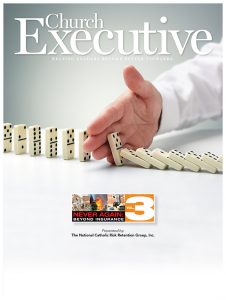Stay “risk aware” or beware!
![]() By Michael J. Bemi
By Michael J. Bemi
Our series on moving “beyond insurance” has identified and examined all the critical elements and related processes to enable an insured entity to “move beyond” insurance.
Reality dictates, however, that even if you substantially self-insure your risk (i.e., employ “alternative risk financing”), and no matter what form of self-insurance you pursue (individual self-insured account; participation in a self-insured pool; captive insurance company; risk retention group; cell captive; etc. — “alternative risk mechanisms”), you’re still employing / buying insurance … just from yourself!

This realization compels you to always remember an axiom of alternative risk financing; namely, the value of self-insurance completely disappears if you allow your total cost of risk to exceed the premiums you would pay simply to purchase comparable commercial insurance in the standard marketplace. [Note that your total cost of risk, or TCOR, is equal to the losses you retain, plus the self-insurance administrative expenses you incur (for risk control; claims management; special regulatory, tax and / or accounting services), plus the cost of premiums you pay for excess coverage.]
Probably the biggest threat to your TCOR outstripping commercially available premiums is the failure to constantly and vigilantly remain “risk aware.”
So, what does “risk aware” mean?
“Risk aware” is the process of consistently assessing changes in your operational environment, to prevent (to the extent humanly possible) being “blind-sided” by a risk(s) you didn’t contemplate and which are now costing you a great deal in newly retained losses.
Here are just some matters that church bodies should be aware of and monitor:
Employment practices, and discrimination in general: As a function of our Constitution’s First Amendment “anti-establishment” and “free exercise” clauses ultimately leading to the “ministerial exception” / “ecclesiastical exception” doctrine, plus the federal Religious Freedom Restoration Act (RFRA) and its counterparts in many of the states — plus, the Religious Land Use and Institutionalized Persons Act (RLUIPA) — church bodies have a great deal of latitude to make
hiring / firing and facilities use decisions that would otherwise be considered illegal discrimination if undertaken by non-religious entities.
However, this is an area constantly being legally challenged. It would be foolish to assume that religious entities are always “bulletproof” and can do whatever they

please in these arenas of employment practices and facilities use. (Confer with your legal counsel for more information.)
Use of drones: Drones can be very valuable for safely inspecting church steeples and roofs and / or premises safety conditions. However, I know of at least one fatality that occurred at a religious premise involving a malfunctioning drone.
Make sure your operators are trained; that they comply with any state and federal drone use guidelines; and that your drones are properly and regularly maintained.
Transgender issues: Your doctrine may not — or may — provide some accommodation for and acceptance of transgender people. Notwithstanding your doctrinal position, they might arrive at your place of worship for guidance and consolation. Are you prepared to address such circumstances in a fashion that doesn’t invite a lawsuit? For example, would you have restroom facilities or a related protocol that a transgender individual could make use of?
Church police forces: At least one faith community in the South has received local government approval to establish and maintain its own police force. One needn’t search too long to find multiple current examples nationwide of alleged police professional malfeasance.
If you’re considering this option, do you think you have the appropriate knowledge, experience, training and resources to do so without creating additional serious liability situations for your church body?
Cyber ministries / strategies: One could easily argue that, in this day and age, your congregation is “missing the boat” if it doesn’t at least consider using the Internet and social media to expand and enrich its ministries. Nevertheless, we all recognize the associated and inherent dangers of unplanned, unsupervised and uncontrolled use of the Internet and social media.
I’m sure you now get the idea: to move beyond insurance, you must stay risk aware!
Michael J. Bemi is president & CEO of The National Catholic Risk Retention Group, Inc. (Lisle, IL) — a recognized leader in risk management. To learn more about available coverage — and to get valuable tools, facts and statistics — visit www.tncrrg.org.


